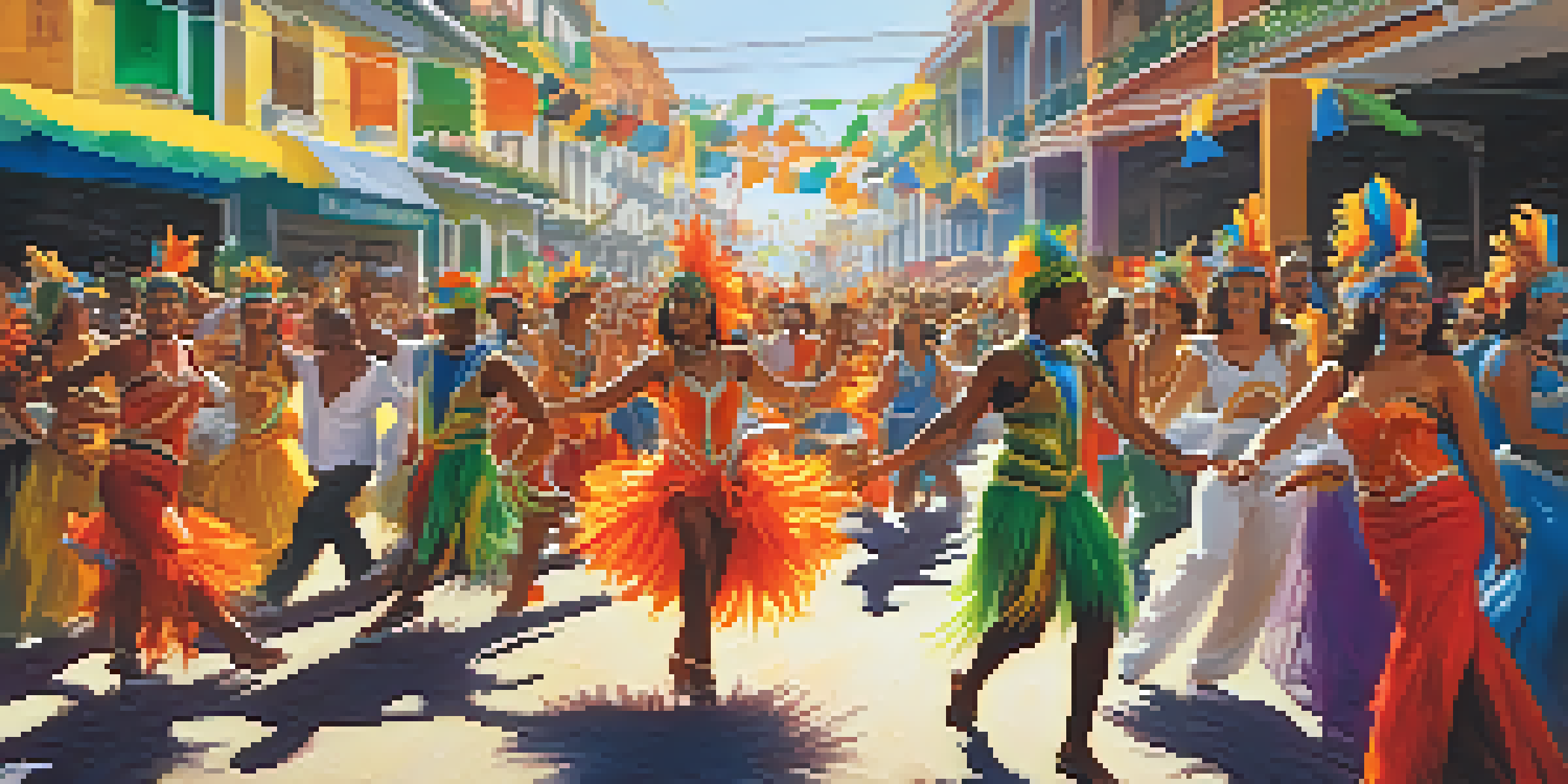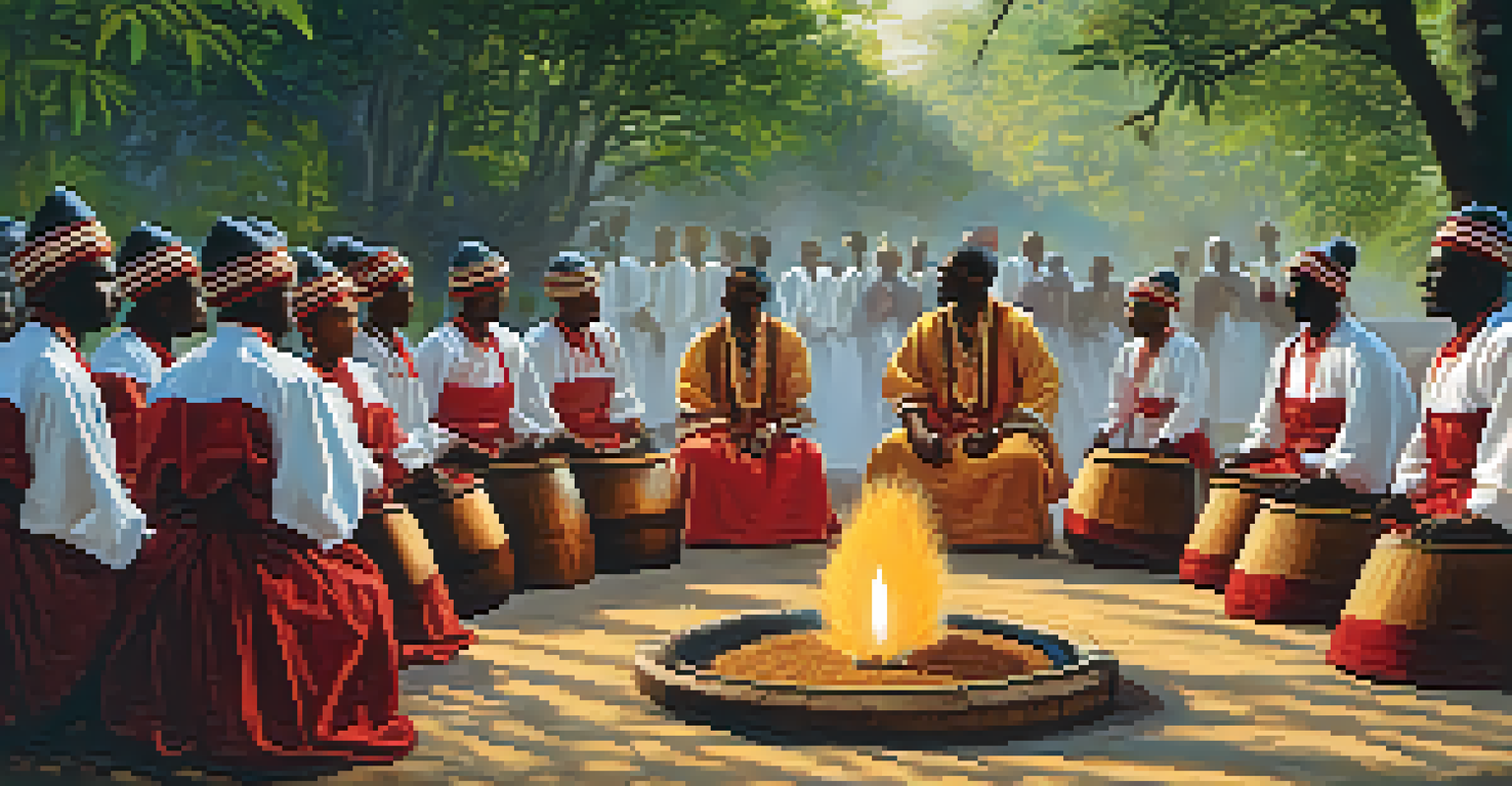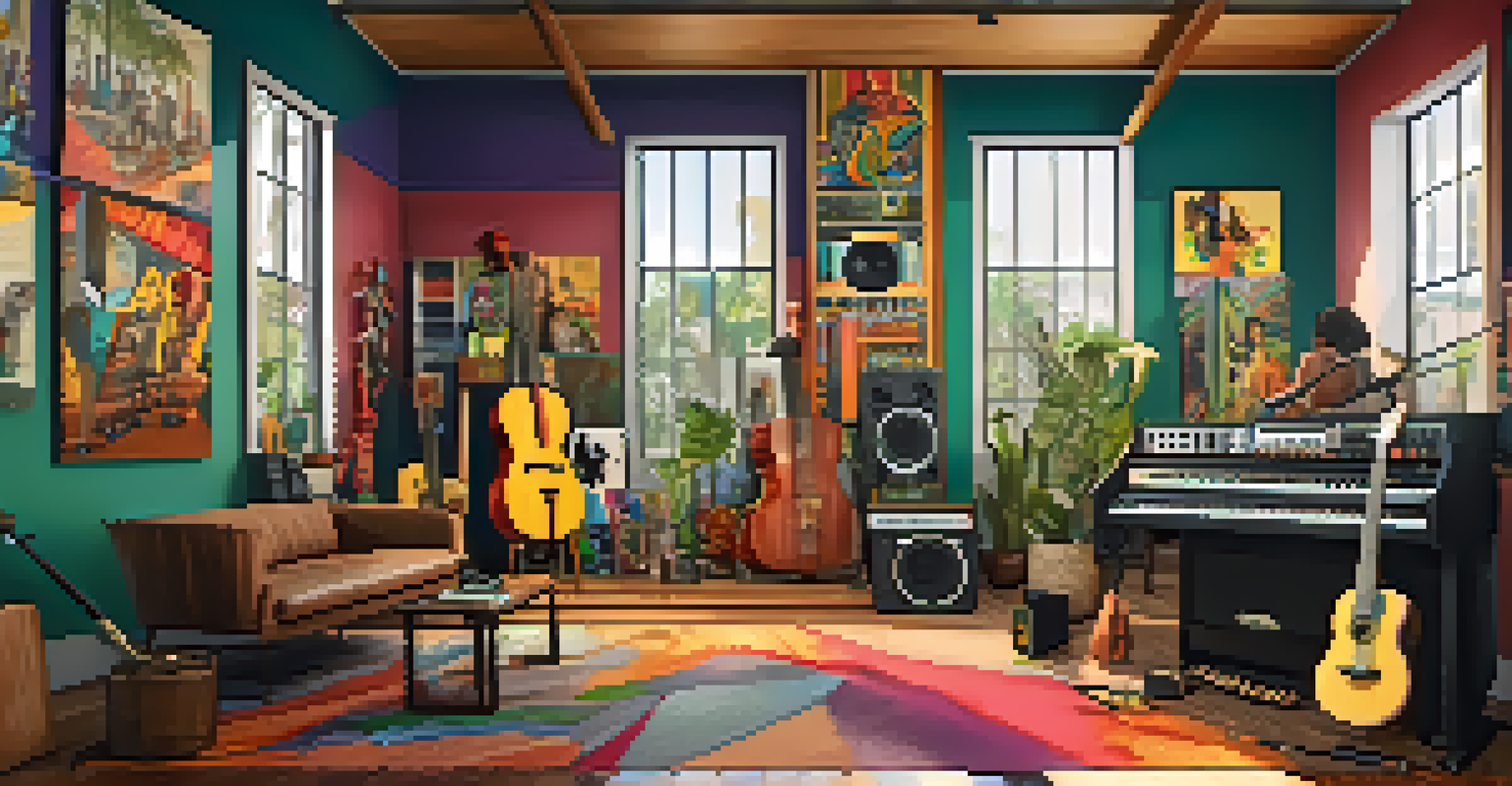The Influence of African Rhythms in Brazil's Music Tours

The Roots of African Rhythms in Brazil's Musical Heritage
Brazil's music is a vibrant tapestry woven from various cultural influences, with African rhythms playing a critical role. These rhythms were brought to Brazil by enslaved Africans, who infused their musical traditions into the fabric of Brazilian culture. From the samba to the bossa nova, the heartbeat of African music resonates in many popular forms.
Music is the shorthand of emotion.
This blending of cultures created a unique sound that reflects the struggles and joys of the people. The influence of African drumming techniques can be traced back to traditional ceremonies and communal gatherings, where music served as a vital means of expression. Such historical context highlights the importance of recognizing these roots in understanding Brazil's musical landscape.
Today, the legacy of these rhythms is celebrated in music tours across Brazil, showcasing their enduring impact. Musicians continue to honor their heritage by incorporating African beats into modern compositions, creating a dynamic interplay of old and new. This cultural exchange ensures that the essence of African music remains alive in Brazil's vibrant music scene.
Samba: A Celebration of African Influence
Samba is often considered the heartbeat of Brazil, and its roots are deeply embedded in African rhythms. Originating from the Afro-Brazilian communities in Rio de Janeiro, samba evolved from traditional African dance and music forms. The syncopated beats and lively melodies reflect the energy and spirit of the African diaspora in Brazil.

During carnival season, samba takes center stage, drawing tourists from around the world to experience its vibrant performances. Street parades filled with colorful costumes and rhythmic beats create an electrifying atmosphere that showcases the cultural significance of samba. This celebration not only entertains but also educates audiences on the historical connections to Africa.
African Rhythms Shape Brazil's Music
African rhythms are foundational to Brazil's diverse musical landscape, influencing genres from samba to bossa nova.
The influence of African rhythms in samba continues to inspire contemporary artists, leading to innovative fusions and new genres. Musicians experiment with traditional sounds, blending them with modern influences to create fresh interpretations. This ongoing evolution keeps samba relevant and exciting for new generations, ensuring its place in Brazil's music tours.
Candomblé: The Spiritual Connection to Music
Candomblé is an Afro-Brazilian religious practice that intertwines music, dance, and spirituality, showcasing the deep roots of African culture in Brazil. The rituals of Candomblé involve drumming, singing, and dancing to honor the orixás, or deities, who are central to the faith. This musical expression serves as a form of spiritual communication, bridging the human and divine.
Samba is a cultural expression that speaks to the heart of Brazil's identity.
The rhythms of Candomblé have influenced various music genres in Brazil, particularly in the realm of popular music. Artists often draw inspiration from these sacred rhythms, incorporating them into their work to create a rich soundscape. This fusion not only celebrates African heritage but also fosters a deeper understanding of Brazil's diverse cultural identity.
Music tours that focus on Candomblé offer a unique opportunity for audiences to witness this powerful connection firsthand. Participants can engage with the music, learn about the rituals, and appreciate the profound significance behind each beat. Such experiences enrich the understanding of Brazil's cultural tapestry and highlight the ongoing influence of African traditions.
The Role of Capoeira in Shaping Music Culture
Capoeira, a Brazilian martial art that combines elements of dance, acrobatics, and music, is another vivid example of African influence. Originating from the African slaves who sought to preserve their cultural identity, capoeira has evolved into a symbol of resistance and resilience. The rhythmic music that accompanies capoeira is essential, providing the heartbeat for practitioners.
The instruments used in capoeira, such as the berimbau and atabaque, are deeply rooted in African traditions. These instruments produce distinct sounds that create a lively atmosphere during capoeira performances. The interaction between music and movement reflects the seamless integration of African rhythms into Brazilian culture.
Candomblé and Spiritual Musicality
Candomblé showcases the deep spiritual connection between African rhythms and Brazilian music, enriching cultural identity and expression.
Capoeira performances often attract tourists, offering a captivating glimpse into this dynamic art form. Music tours that include capoeira provide an engaging way for visitors to experience Brazil's cultural heritage. By witnessing the melding of rhythm, movement, and history, audiences can appreciate the profound impact of African influences in Brazilian music.
Bossa Nova: Fusing African Rhythms with Jazz
Bossa nova is a genre that emerged in the late 1950s, blending Brazilian samba with jazz influences. While it may seem distinct from its African roots, bossa nova is heavily informed by the rhythms and melodies that African music introduced to Brazil. The gentle syncopation and smooth melodies of bossa nova reflect a sophisticated evolution of these original beats.
Artists like João Gilberto and Tom Jobim played pivotal roles in popularizing bossa nova, creating timeless classics that resonate with audiences worldwide. The genre's cool, laid-back style showcases how African rhythms can be reinterpreted and integrated into different musical forms. This cross-cultural exchange demonstrates the versatility and adaptability of African influences.
Music tours featuring bossa nova offer a delightful experience, allowing audiences to enjoy the genre's rich history and its connection to African rhythms. By understanding the roots of bossa nova, listeners can appreciate the creativity and innovation that arise from cultural fusion. This genre continues to inspire musicians, proving that African rhythms have an enduring presence in Brazil's music scene.
The Influence of Afro-Brazilian Festivals
Afro-Brazilian festivals are vibrant celebrations that honor the contributions of African culture to Brazil's identity. Events like Festa de Iemanjá and the Festival de Capoeira draw large crowds, showcasing traditional music, dance, and rituals. These festivals serve as a reminder of the historical significance of African rhythms and their ongoing influence in contemporary Brazilian culture.
During these celebrations, attendees can immerse themselves in the sounds of live music that echo African traditions. Drumming circles, dance performances, and singing create a lively atmosphere that unites communities and fosters cultural pride. The joyous spirit of these festivals reflects the resilience and creativity of Afro-Brazilian culture.
Modern Artists Revive African Heritage
Contemporary Brazilian musicians are embracing and revitalizing African rhythms, ensuring their relevance in today's music scene.
Tourists attending these festivals gain a unique insight into Brazil's diverse cultural heritage. Engaging with local musicians and performers provides a deeper understanding of the historical connections to Africa. These experiences highlight the importance of preserving and celebrating African rhythms within Brazil's vibrant music landscape.
Modern Artists and the Revival of African Rhythms
In recent years, modern Brazilian artists have increasingly embraced their African roots, creating a revival of traditional rhythms in contemporary music. Musicians like Liniker, BaianaSystem, and Elza Soares incorporate Afro-Brazilian influences into their work, blending genres and styles that resonate with today's audiences. This resurgence highlights the enduring relevance of African rhythms in the evolving music scene.
These artists often collaborate across genres, creating innovative sounds that reflect the diversity of Brazil's cultural landscape. By fusing traditional African rhythms with contemporary styles, they invite listeners to experience the richness of their heritage. This creative approach not only honors the past but also paves the way for future generations of musicians.

Music tours featuring these modern artists showcase the vibrant tapestry of Brazilian music and its roots in African rhythms. Audiences can witness firsthand how these influences shape contemporary sounds and connect with the rich history behind them. This ongoing celebration of African culture ensures that its impact remains a vital part of Brazil's musical identity.